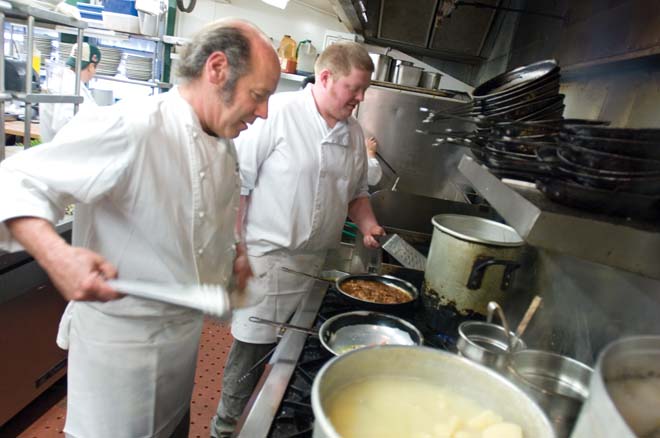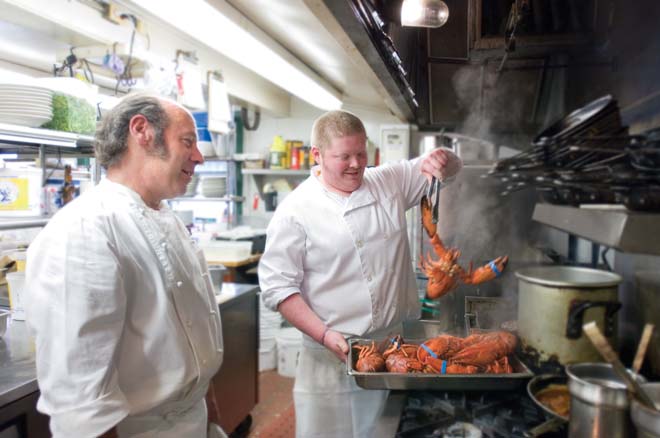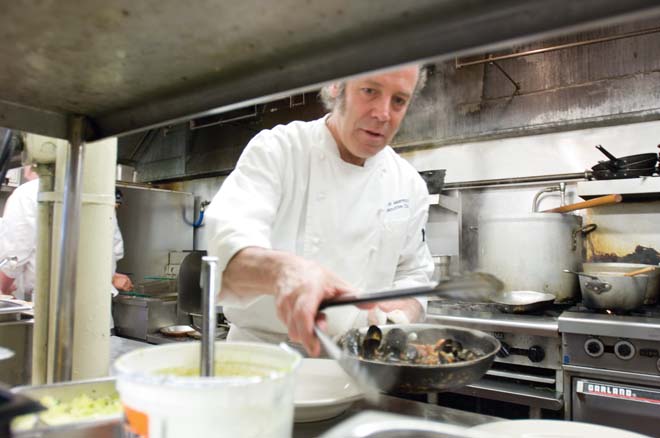Three Tiers on the Pier
FEAST-August 2009 (from Maine Home+Design)
By Rebecca Falzano
Photographs by François Gagné
If restaurants could talk, Pier 77 on Cape Porpoise Harbor would have some tales to tell. For more than seventy years, the site overlooking a working pier has been a local landmark. It was once home to Tilly’s Shanty, a favorite lobster shack of President George H. W. Bush, and more recently, a restaurant named Seascapes. While owners and names have changed throughout the decades, one thing has remained constant: at this spot, all eyes are on the view.
That sweeping harbor view is what enticed owners Kate and Pete Morency to move from California to Maine in the dead of winter. It was January 2003, and despite the cold and snow the couple fell in love with the restaurant, which was up for sale at the time. After working in San Francisco restaurants for years, Kate and Pete were further enticed by Pete’s sister, Jaye, who lives in nearby York along with Pete’s father. “We took one look out the windows and said, ‘We can do this,’ and that was it,” says Kate.
Six years have passed since that winter day, and now Pete is head chef while Kate manages the front of the house. The couple, who have been married for ten years, have long since mastered the art of cooperation in this business: they met working together at a restaurant in Sausalito, where Pete was a chef and Kate was a server. “He had the most smiling eyes I’ve ever seen,” recalls Kate. “And I used to carry her plates out from the kitchen to the tables for her—I was always following her around,” says Pete with a laugh.
Part of the intrigue of Pier 77 is that it’s only half of the story. The Morencys also run the more casual Ramp Bar & Grill, an intimate and charming pub located below Pier 77. Perhaps most impressive is how the Morencys operate two restaurants on three floors out of just one small kitchen. “People are running up and down all the time,” says Kate. “The whole building just buzzes.”
While the views are, without a doubt, remarkable from both Pier 77 and The Ramp, the entire ambience shines on its own thanks to an extensive renovation. “We were going for casual, comfortable, and hip—but elegant,” explains Kate, who redesigned the interiors of Pier 77 herself to brighten the space. Because of the restaurant’s provenance as a fancier dining venue, the couple had some trouble breaking with its tradition of formal dining. “I think some people have it in their minds that it’s a special-occasion restaurant, but we view it as more laid back than that,” says Pete.
Even more laid back is The Ramp below, which Kate jokingly refers to as “Pete’s restaurant,” since the chef himself has provided his own signature design touches. Walls lined with Pete’s sports memorabilia offset a stadium turnstile, seats from Wrigley Field, and an illuminated scoreboard. Outside, a patio area with yellow Adirondack chairs on a bed of broken clamshells offers an upfront look at the harbor. The Ramp’s menu fits its casual ambience, offering hamburgers, lobster rolls, fried clams, and the like.
Whether whipping up fish and chips for The Ramp or a more elaborate seafood stew for Pier 77, Pete has an ease in the kitchen that comes from thirty-seven years of restaurant experience. Yet his love of cooking began during his childhood. “My father was a liquor salesman and my mother was a great cook. I was always pulling out pots and pans and banging them around while she was cooking. She’d call out to me and I couldn’t answer because I’d have a meatball in my mouth,” he recalls with a laugh. With his mother’s encouragement, Pete went to the Culinary Institute of America in New York. “At the time, no one wanted to be a chef,” he says. In 1973, after graduating, he worked at the Parker House and Café Budapest in Boston. Eventually, he moved to the West Coast to work at the Mark Hopkins, the Park Hyatt, and the opening of the Hotel Nikko, not to mention a two-week stint for Jeremiah Tower, the renowned chef credited with inventing California cuisine. The range of culinary influences he encountered in each of these hotel restaurants gave Peter an education in world cuisine that he draws upon often. “I worked in so many different kinds of restaurants—Chinese, Japanese, Portuguese, Mexican—with so many different kinds of people. Each one was a learning experience,” he says.
In the kitchen of Pier 77, Peter combines East and West Coast flavors to produce contemporary American fare using local ingredients. On the seafood-filled menu, Asian and Mexican twists can be found in the pan-seared scallops with wasabi mashed potatoes and soy-glazed baby bok choy and black bean vinaigrette, for example, or the giant tequila prawns with black beans, salsa, and tortillas. Oysters bingo, a seafood mixed grill, and lobster in the rough are rounded out by hanger steak and chicken fettuccine. Pete, who can make up to seventy lobster rolls a day for The Ramp, says he sometimes wishes he could change the menu around more, but consistency is what his regular patrons come back for. “Instead, we mix it up by preparing the entrees differently. There’s a real democracy in the kitchen; everyone is involved in decisions about the menu,” he says.
At five o’clock in the evening on an early summer day, tables of diners order offerings from the sea and talk about their days. As they await their meals, a lone lobsterman in the harbor below disappears beyond the bend. When the appetizers arrive, he is motoring in with traps and buoys stacked high. By the time the main course appears, he has descended into his dinghy and rowed to the pier. His long day is over, but the night at Pier 77 has just begun.































































